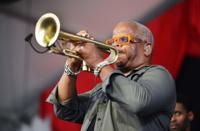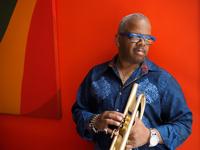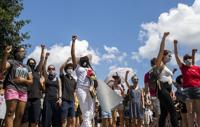I really don’t know where to start. This past year has been such an onslaught of terrible images, deeds, emotions and utter sorrow.
When I saw the video of George Floyd under the knee, being murdered, I heard myself saying, “Here we go again.” I was preparing for the usual course of events: Outrage, condemnation, tears, a call for justice, and the usual refrain of “thoughts and prayers for the family.”
This has been our history of late. A shrug of a learned, knee-jerk, response. A lowered expectation of any subsequent action in this country. Disheartened that the normalization of these events has chipped away at my belief system, I feel, at times, challenged to hold on ever so tightly to what has gotten most of us through all of these horrible acts of violence, for I fear even that would disappear.
My fellow Americans did not disappoint this time. A silent majority finally found their voice. I am overjoyed seeing large protests across this nation, reaching all the way into small towns and suburbs, the pain and outrage on the faces, faces of all colors, ages, and sexes, people from all walks of life protesting. They’ve been disenfranchised for so long, they now need to have their voices heard.

Terence Blanchard at New Orleans Jazz & Heritage Festival.
Maybe this time will be different. Maybe those who have the ability to make the change — those not on the streets, those who stubbornly build walls between themselves and those who they say they serve — will have their hearts and minds opened to what has been happening for generations, and feel the need to address it in a way that goes well beyond “thoughts and prayers.”
It takes concentrated power to uproot harmful belief systems. A study of 323 political and social movements from 1900 to 2006 by Erica Chenoweth of Harvard University's John F. Kennedy School of Government and Maria Stephan of the U.S. Institute of Peace determined that sustained protest movements need 3.5% of the population to participate.
Such movements need to be big and inclusive so they cannot be ignored. In repressive regimes, the crowds of protesters have to be so inclusive as to dissuade the armed forces from attacking their neighbors, sons, daughters, co-workers, friends and family. That means in America, 13.5 million of us need to get on the frontlines.
We have seen demonstrations deep in the heartland, in places like Paducah, Kentucky; Farmington, Missouri; and Holland, Arkansas. The New York Times wrote about rallies in Vidor, Texas, a town with a dark history written with the hate of the KKK. Still, it will take more time and effort to get close to the 3.5% solution.
Watching people protect the protesters made me proud. Lines of protesters pushing back against looters. Lines of reinforcements with eyewashes, water and paper towels to fight off the tear gas and pepper bombs. They are not giving up because of negative attention; they are weathering the storm.
A protest is patriotic — it means you give a damn! Otherwise why take the heat, which will most surely come, either through word, ostracism, or the tear gas and batons of the police? It takes guts to put your life on the line by protesting.
The dogma of those who have no intention to hear our cry for justice is to wrap themselves in patriotism and to cast off those who don’t see things their way as un-American. Martin Luther King Jr. cautioned us to be wary of those with good intentions. “The white moderate, who is more devoted to order than to justice,” he wrote in “Letter from Birmingham Jail,” was more of an impediment than “the White Citizens Councilor or the Ku Klux Klanner.”
The racist I can see, because they make themselves seen. It's the well-meaning folk who have baffled me for years. I wonder how so many people who have done good work for so many can be so tone-deaf.
I was doing an interview about a film in which my music sits in the soundtrack alongside the music of Marvin Gaye. We started talking about his song "What's Going On" and how so many people love that song. But does everyone really hear the words?
“Mother, mother, there’s far too many of you crying/Brother, Brother, brother, there’s far too many of you dying /You know we've got to find a way to bring some lovin' here today …
“Father, father, we don't need to escalate/You see, war is not the answer, for only love can conquer hate/You know we've got to find a way to bring some lovin' here today …
“Picket lines and picket signs, don't punish me with brutality/Talk to me, so you can see what's going on …”
Then it hit me: So many people listen to the groove and the melody of “What’s Going On” without really hearing the words, just like so many well-meaning people have heard the melody of our plight but have not really heard the words.
They can hum the melody back to you with the same phrasing and inflections as you, making them and you think they know the song just as well as you do. They honestly love the melody to the point where you're certain that they get it. They can groove to the beat the same way you would.
But it’s like the words they are singing are in a different language, since the song has a different meaning. While the pain is a lingering, never-going-away pain for you, it's only a temporary pinprick for the well-intentioned and well-meaning. It’s just enough discomfort for a false sense of assimilation and understanding. The luxury of it only lasting for a moment is not fully realized.
I love how many HAVE heard the words and been called to action, how many are making their voices heard and their numbers count. I love how it is not just radicals and people of color. I love the inclusivity of the crowds at protests and the array of slogans.
But those with agency, those with an audience, those whose voice means something, those looked up to as heroes, as superstars, as the metaphorical foundation of America — now is also the time for them to hear the words and not just hum the melody.
To see the pain that doesn't go away.
To understand the smile that hides the immense hurt that overshadows daily life.
To understand how the color of your skin colors your life.
To feel the shame of knowing no matter what you do, no matter how famous you are or how much money you make, some still view you as someone that doesn't deserve the right to breathe freely.
So you, the well-meaning supporter, have to be very careful with your words, more so than me.
My words can fall on deaf ears, but yours can mistakenly harm someone's life. What you say and do has consequences. Your words may be taken as a rallying cry, a call to arms, a dog-whistle to the unintelligent.
Silence is dangerous, silence is violence, so you cannot be silent now.
Being a native son of New Orleans, it warmed my heart to hear Saints quarterback Drew Brees take on President Donald Trump, reiterating that kneeling during the national anthem was never about the flag. NFL commissioner Roger Goodell has echoed those sentiments. Well played, guys.
While I love Drew for his courage in standing up to our president and would love to have him and other White quarterbacks take a stand and a knee, sadly, I'm still cautious about what happens next. Is this the same old cycle where we are battered and beaten and finally give up in acceptance, ending up with a low-grade rage till the next incident?
Please, let’s not make this an extended version of the same old song. Let’s write a new one that everyone contributes to in their own way, so it pushes us to create change. We need a new song with a melody that allows us all to say our piece and lyrics that urge us to be our best selves. Where we can rely on our own beliefs and not depend on those who have none.
It's a precious moment in time when many hearts, ears, and minds are now open to listening. Let's take advantage of it and make our mark on the world. Let’s all listen to each other. Let’s have a song that will give us some peace.
Within peace is always love. At the conclusion of concerts, I often say, "Love wins out every time!"
It has to.
______________________
Terence Blanchard is a Grammy-winning and Academy Award-nominated jazz trumpeter from New Orleans. His recent projects include composing music for “Da 5 Bloods,” his latest collaboration with director Spike Lee, and HBO’s new reboot of “Perry Mason.” A version of this essay previously appeared on National Public Radio's website.
"hear" - Google News
June 25, 2020 at 08:00PM
https://ift.tt/2ZbPOZZ
New Orleans musician challenges Americans to hear words of protest songs, not just catchy tunes - NOLA.com
"hear" - Google News
https://ift.tt/2KTiH6k
https://ift.tt/2Wh3f9n
Bagikan Berita Ini

















0 Response to "New Orleans musician challenges Americans to hear words of protest songs, not just catchy tunes - NOLA.com"
Post a Comment